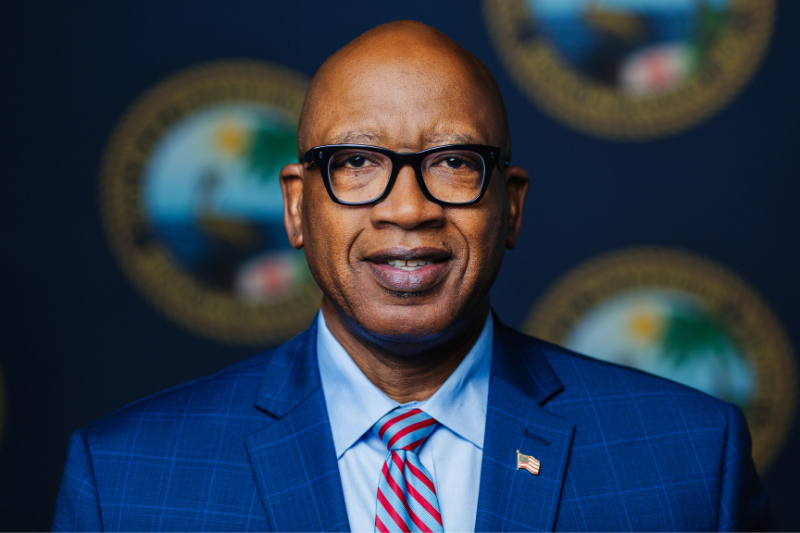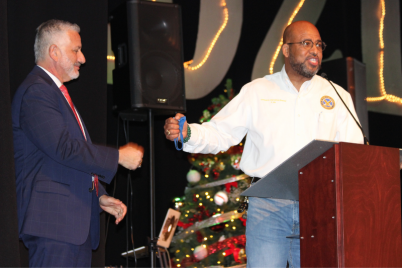Mayor Welch discusses the city’s economic equity strategies with CEGTBA
BY FRANK DROUZAS, Staff Writer
ST. PETERSBURG — Mayor Ken Welch stopped by March’s virtual Collective Empowerment Group of Tampa Bay Area (CEGTBA) meeting to discuss his economic equity strategies and the economic development goals for the City of St. Petersburg.
Recently returned from a trip to Tallahassee where he was lobbying with his team for the city’s legislative priorities, Welch said there is a “literal attack” on equity programs, as it exists on every level, from kindergarten through college. His administration is undertaking a fact-based approach to building a diversity, equity and inclusion (DEI) office to withstand any challenge. The mayor underscored that he is committed to inclusive progress and equitable development and believes the community is also.
“We don’t wake up every day looking for a fight with Tallahassee, but there are some things worth fighting for,” he said, adding that we have “the lived experience to know the disparities that have happened in our city and in our county.”
There is even a Structural Racism Study commissioned by the city that documents all this, Welch said. He is currently looking at models around the country for the city’s own DEI office and simultaneously conducting an employee survey to look at the city’s internal climate to discern what employees feel the current equity environment is.
Other changes his administration is implementing for the city include an Office of Supplier Diversity (OSD), which aims to ensure diversity and inclusion are a part of St. Pete’s culture, procurement and supplier processes. This builds upon the recent expansion of the small business programs with an intentional focus on minority businesses, which moved the needle from $70,000 worth of business going to these small businesses to more than $20 million.
“We are charting that same course,” Welch said, “but in addition to having that intentionality from the mayor’s office throughout the organization, we also have a disparity study that has shown underutilization for minority- and women-owned businesses.”
LaTasha Binder is the manager of the OSD and will work alongside a staff that includes an analyst certification specialist and three contract compliance coordinators.
“We are going to, of course, track and measure utilization — if you don’t measure, it’s not a priority,” he said.
Welch said the office would concentrate on outreach — making sure businesses have the capacity to work with the city — and noted there is even an ordinance that will embed the minority- and women-owned business enterprise program in the city code. He wants to reach every business “from construction to catering” to make sure they know the opportunities with the city.
Welch said that one of the most significant projects the city will see for decades is the redevelopment of the historic Gas Plant district.
“There was a community there that many of you know about,” said the mayor, who grew up in that neighborhood. “It was a walkable community where you can get dry cleaning and a great meal, go to church and then walk home. And that was uprooted for the progress of the community.”
In the current RFP for the redevelopment, Welch stressed that there are provisions targeting minority businesses for construction and operation.
“That is 40 years of promises, of progress, that we have the opportunity to make sure finally come to fruition,” he said, “and that will remain a priority for us.
As for ensuring there will be affordable housing in the new Gas Plant district for people who were forced out due to gentrification, Welch said he focused on affordable and workforce housing, which is something he ran his campaign.
During his Tallahassee trip, he met with a Florida Sen. Kathleen Passidomo, who has a lead bill — which passed the state house and senate and is awaiting the governor’s signature — that deals with affordable housing, he said.
“It gives us more flexibility, more funding from the Sadowski fund and others,” he said, “and as you know, our focus has always been on that 80 percent AMI and below…the state now even understands that’s a priority because we’re losing businesses [and] businesses are hiring folks, the folks come down, and they can’t find a place that’s affordable.”
Welch said the area is seeing an increase in luxury apartments and condos in recent years but not enough of an increase in affordable housing. He noted that the Penny for Pinellas initiative and the CRA he worked to get in place in south St. Pete are generating funds for affordable housing.
Furthermore, there are plans to construct 76 affordable townhomes on 18th Avenue and over 1,400 units of affordable housing onsite and offsite for the redeveloped Gas Plant district, among other similar projects around the city, the mayor said.
Welch also pointed out that it isn’t only about getting people in homes but making sure their homes are sustainable, as many minority residents are often the most affected by rising sea levels and climate change. He underscored that he would use all the resources available to help weather-proof the housing and has “ramped up” the grant team to try and access federal funds.
For more information on CEGTBA, visit www.cegtba.org








